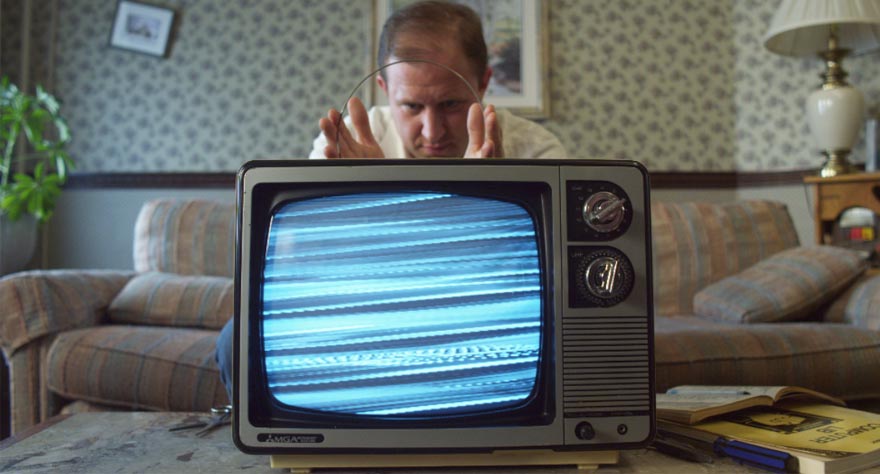
This '80s-set dramedy is as cumbersome as the nascent technology at the center of its plot.

This '80s-set dramedy is as cumbersome as the nascent technology at the center of its plot.
I’m always quick to mention how great it was being a film buff while growing up in the ’80s—that Golden Age when both cable and home video exploded to offer all the classics one could consume (with or without cheese). But it has also been great living in the Information Age, where the portal to all data and the lifeline for all communication can now fit into a back pocket. It wasn’t always that easy, of course, and just as it’s quaint to stumble across a VHS tape with a “Be Kind, Rewind” sticker on it, so too is it nostalgic to be reminded of that time when we didn’t realize just how cumbersome “high tech” was. Parallax, a dramedy set in the Decade of Decadence, not only highlights how cumbersome technology was back then, but unfortunately does so in a cumbersome way.
In the film’s prologue, the year is 1983 and Abbott (Michael Kelberg) is a married college professor in pursuit of something greater: the creation of “Zeteo Vision,” a revolutionary communication tool. (Zeteo Vision, aka Z-TV, is a device best described as the fictional precursor to YouTube.) Coming out of the prologue and into present-day 1987, Abbott is still in pursuit of that vision, only his obsession has since cost him his job and his marriage. As he slowly moves closer to realizing his dream, he encounters obstacles expected (technical and financial) and unexpected (the addictive nature of his creation).
Making his feature debut with Parallax, writer/director Graham Nolte attempts to execute something rather interesting. He tries to tell a cautionary tale about obsession with social-based technology and the pitfalls that accompany that obsession—pitfalls that are as relevant today as they ever have been—but he does so by setting the story in technology’s early years, a time when many might not consider this problem to be as pervasive as it is today.
The obsession can be found in different forms and in most of the main characters. Abbott is obsessed with the creation of the tech to the expense of his marriage and career. Abbott’s former student, Mannix (Robb Stech), already burnt out on tech, loses himself in the ability to upload commercials to Z-TV. Villini (Jim Ludovici), from whom Abbott acquires server space, decides time-shifting (my phrase, not the film’s) his soap operas would be a better experience than watching them live as he had before Z-TV. And even the one “positive” use of the tech is still obsession-fueled: Abbott’s friend, Finbar (Phillipe Simon), finds a love interest as a result of using Z-TV.
It’s an interesting conceit, placing this modern issue in perhaps the most appropriate period setting, and doing so avoids any sense of preaching by instead creating something of a “the more things change, the more they stay the same” message. The problem is the execution is so terribly dull.
The core of the story concentrates on Abbott’s efforts and obstacles to make Z-TV a reality. This requires endless conversations about things like network access, technical capabilities, practical applications, impractical applications, government grants, etc., none of which are the least bit interesting. The lines feel as if they’ve been lifted from a Z-TV training video, and they are delivered by the cast with about the same level of enthusiasm. It’s hard to fault the cast though, given what they have to work with. As a singular presentation, the scenes don’t flow so much as they coexist.
Compounding this problem is Nolte’s apparent awareness that the conflict his plot presents is dry, but rather than work to make it more interesting holistically, he instead injects fleeting, unfunny moments into scenes. On one Z-TV delivery, a dog pees on the device; in another scene, during Abbott’s pitch for grant money, his device is struck by a vehicle and destroyed. Moments like these are incredibly contrived and only serve to highlight the script’s deficiencies.
Also missing is any real notion of consequence. Abbott has already lost his job and his wife, and his present path is strewn with obstacles, but there is no the sense of what will happen if he fails to launch Z-TV. Because the story is about being successful, there needs to be a result of failure lurking over Abbott’s shoulder to get the viewer invested, and it simply isn’t there. Also missing is any development of what is hinted at as the chance for reconciliation between Abbott and his ex, Lucia (Mary Sarah Agliotta). That she is now engaged to the man who holds Abbott’s grant fate in his hands only seems creatively opportunistic, not the result of an idea fully vetted.
The film is not without its bright spots. Sprinkled throughout are the commercials Mannix is addicted to, as well as scenes from the soaps Villini loves. Most of these moments are genuinely funny. The soap scenes are intentionally overwrought for laughs, and the faux commercials are reminiscent of actual ads shown in the ’80s (think Wacky Packages). From a technical perspective, there are several scenes where the POV actually comes from within a television screen, simultaneously framing the individual watching it while offering an opaque projection of what is on the screen. It’s deft technical presentation that lifts every scene that employs it. From the cast, Simon is the standout.
With Parallax, Graham Nolte goes back to the past to offer a reflection on the present. Technology is wildly more advanced today than it was 30 years ago, but the problems it presents are no different from back then. Had Nolte focused more on the intricacies of the dilemmas technology presents instead of the granularity of the technology itself, the finished product may have been more compelling. Instead, it’s more of a corporate video than a tech drama.